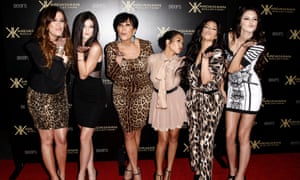
When you think of the Kardashians, is it Kim’s lauded bottom that comes to mind? Or Kris’s reputation as a controlling “momager”? Perhaps it’s something more nebulous, like the family’s reputation for being shallow and talentless; a view shared by the 500,000 people who signed a petition in 2012 to boycott the Kardashians and “bring back smarter TV”.
Back in November, I hosted Kimposium!; a symposium about all things Kardashian at Brunel University in London. The very idea of scholarly attention being given to the world’s most famous reality television family came under attack, especially on Twitter and other online forums.
In the lead up to the Kimposium I was interviewed several times for press and radio and each time was asked to justify the notion of taking the Kardashians seriously. I found myself wondering whether a symposium around, say, Bear Grylls, would have caused the same furore. I doubt it, because the broadcasting of Grylls’ overtly masculine set of skills and the cultural relevance of his labour as a professional wilderness survivor and adventurer seem go unquestioned, despite their irrelevance to the lives of most people.
Keeping Up with the Kardashians follows Kris Jenner and her five adult daughters as they deal with work, love, relationships and children: the programme is about quintessentially “feminine” concerns. In her book The Triumph of Reality TV: The Revolution in American Television, Leigh H Edwards notes that although the programme is “polarising, not least because of [its] obvious profit motive and manipulation … the engine that drives the connection to fans is the storytelling”.
This storytelling often emphasises the love and intimacy between the Kardashian women. In the first episode of the current series, a tearful Kris tells Kourtney, who is separating from her partner,“it breaks my heart to see you in pain”. The episode centres around the women working to protect each other’s emotional health in relation to both Kourtney’s separation and their stepfather Caitlyn Jenner’s gender transition.
Support is a word that is used repeatedly. Kim says: “I just have to balance out all the people and make everyone feel supported.” Younger sister Kendall adds: “I want to be supportive of my mom with what she’s going through.”
It has occurred to me that the hostility around the Kardashians may not be about their supposed shallowness or vanity, but the fact that there are hardly any men on the show — it is about highly successful women and their relationships with each other.
The discipline of popular culture studies is most criticised when it examines the lives of women, the creative work of women, and feminist issues. A black feminism course titled Feminist Perspectives: Politicising Beyoncé, taught at Rutgers University in the US, was recently cancelled despite having been oversubscribed for years. In contrast, The Beatles, Popular Music and Society MA taught at Liverpool Hope University goes without comment.
The study of popular culture, from graffiti to hip-hop to reality television, can enhance philosophical, political and sociological discussions. At the Kimposium we talked about labour, death, respectability, the digital world, trauma and democracy, as well as the more predictable themes of gender, body image, beauty and race.
Popular culture can be used as a pathway into theoretical discussions because it is crucially connected to them, and the more we accept this intertwining, the better we will understand our world. Speaking to students in familiar cultural language is invaluable. But performers like Beyoncé and the Kardashians are important in their own right. These women artists are worthy of study for what they create, represent, and for the cultural texts and dialogues that they are part of.
Elizabeth Wissinger, a professor from the City University of New York , argued at the Kimposium that what the Kardashians do, or perform, is a prototypical feminine kind of labour — she calls it “glamour labour”. This is a form of work that many women (and some men) consciously or subconsciously undertake to some degree. It includes the daily toil of exercising, dieting, removing or adding hair, exfoliating, applying make up, dyeing hair, having cosmetic surgery, and so on and so on. Glamour labour points to the deep interest in the presentation of the body that has become central to cultures in all rich and many poorer parts of the world since the second half of the 20th century.
Watching Bear Grylls kill an alligator, drink his own urine or eat giant beetle larva is fascinating and entertaining. But watching the Kardashians conduct their daily, intimate, feminine lives, and seeing how they perform their glamour labour is more relevant.
Kim and her family won’t teach us how to survive in the wilderness, but they may give us insight into what it means to live in a world where image is crucial, and how to share intimacies and support each other as women in that world.
http://www.theguardian.com/higher-education-network/2016/jan/14/whats-wrong-with-studying-the-kardashians
No comments:
Post a Comment